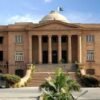WEB DESK: Cameroon’s longstanding leader, President Paul Biya, aged 92, has officially declared his intention to run for an eighth presidential term in the upcoming election scheduled for October 12. As the world’s oldest sitting head of state, Biya’s continued leadership could see him in office until nearly 100 years of age.
In a series of posts on social media platform X (formerly Twitter) , Biya reaffirmed his commitment to serve, stating, “I am a candidate in the presidential election. Rest assured that my determination to serve you matches the urgency of the challenges we face.”
Biya, who ascended to power in 1982 following the resignation of his predecessor Ahmadou Ahidjo, has maintained his grip on power for over four decades. His health has often been a subject of speculation, especially after a 42-day absence from public view last year, which fueled rumors about his well-being. Although the government reassured the public of his good health, discussions about his health remain sensitive and tightly controlled.
The announcement comes after Biya’s previous flirtation with social media engagement, notably in 2018 when he used digital platforms to officially announce his candidacy—a rare move for an African leader of his age. Supporters from the ruling Cameroon People’s Democratic Movement (CPDM) and other allies have long called for him to seek another term, viewing him as a steady hand amid ongoing national challenges.
Opposition voices, however, argue that Biya’s prolonged rule has hindered Cameroon’s democratic and economic development. Critics, including former allies, have called for political renewal, emphasizing the need for change after over 40 years in power. “Cameroon needs fresh leadership and genuine democratic reform, not perpetual repetition,” said Nkongho Felix Agbor, a prominent human rights lawyer.
Biya’s decision to run again will undoubtedly reignite debates over his fitness to govern. He rarely appears in public, often delegating duties to the powerful chief of staff of the presidency. His 2018 re-election, in which he secured over 71% of the vote amid allegations of irregularities, marked his sixth term.
The Central African nation, which gained independence from France and the UK in the 1960s and has only had two presidents, faces complex challenges—including economic struggles, a separatist conflict in the English-speaking regions, and insurgent attacks from Boko Haram in the north. A potential succession crisis looms if Biya’s health declines or if he is unable to complete his term.
Several opposition figures have already announced their candidacies, including 2018 runner-up Maurice Kamto, Joshua Osih of the Social Democratic Front, lawyer Akere Muna, and Cabral Libii of the Cameroon Party for National Reconciliation—all calling for reforms to ensure free and fair elections.
As Cameroon prepares for what promises to be a contentious election season, the nation’s future remains uncertain amidst calls for change and ongoing political tensions



